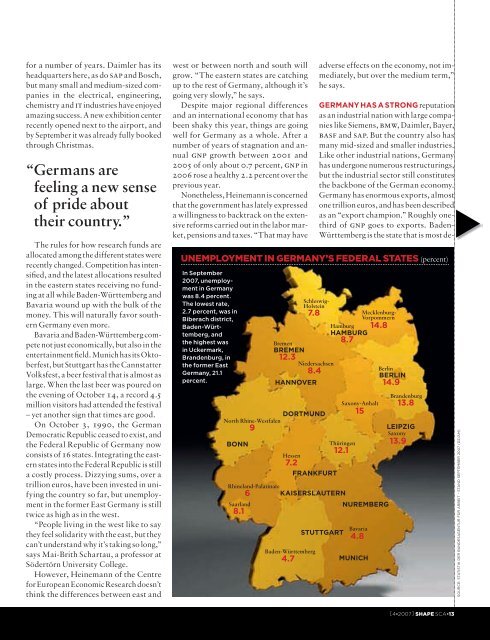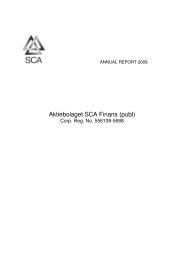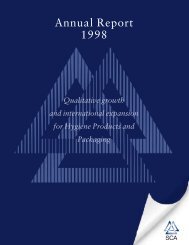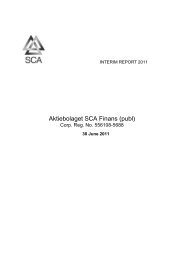SHAPE SHAPE SHAPE
SHAPE SHAPE SHAPE
SHAPE SHAPE SHAPE
You also want an ePaper? Increase the reach of your titles
YUMPU automatically turns print PDFs into web optimized ePapers that Google loves.
for a number of years. Daimler has its<br />
headquarters here, as do sap and Bosch,<br />
but many small and medium-sized companies<br />
in the electrical, engineering,<br />
chemistry and it industries have enjoyed<br />
amazing success. A new exhibition center<br />
recently opened next to the airport, and<br />
by September it was already fully booked<br />
through Christmas.<br />
“ Germans are<br />
feeling a new sense<br />
of pride about<br />
their country.”<br />
The rules for how research funds are<br />
allocated among the different states were<br />
recently changed. Competition has intensifi<br />
ed, and the latest allocations resulted<br />
in the eastern states receiving no funding<br />
at all while Baden-Württemberg and<br />
Bavaria wound up with the bulk of the<br />
money. This will naturally favor southern<br />
Germany even more.<br />
Bavaria and Baden-Württemberg compete<br />
not just economically, but also in the<br />
entertainment fi eld. Munich has its Oktoberfest,<br />
but Stuttgart has the Cannstatter<br />
Volksfest, a beer festival that is almost as<br />
large. When the last beer was poured on<br />
the evening of October 14, a record 4.5<br />
million visitors had attended the festival<br />
– yet another sign that times are good.<br />
On October 3, 1990, the German<br />
Democratic Republic ceased to exist, and<br />
the Federal Republic of Germany now<br />
consists of 16 states. Integrating the eastern<br />
states into the Federal Republic is still<br />
a costly process. Dizzying sums, over a<br />
trillion euros, have been invested in unifying<br />
the country so far, but unemployment<br />
in the former East Germany is still<br />
twice as high as in the west.<br />
“People living in the west like to say<br />
they feel solidarity with the east, but they<br />
can’t understand why it’s taking so long,”<br />
says Mai-Brith Schartau, a professor at<br />
Södertörn University College.<br />
However, Heinemann of the Centre<br />
for European Economic Research doesn’t<br />
think the differences between east and<br />
west or between north and south will<br />
grow. “The eastern states are catching<br />
up to the rest of Germany, although it’s<br />
going very slowly,” he says.<br />
Despite major regional differences<br />
and an international economy that has<br />
been shaky this year, things are going<br />
well for Germany as a whole. After a<br />
number of years of stagnation and annual<br />
gnp growth between 2001 and<br />
2005 of only about 0.7 percent, gnp in<br />
2006 rose a healthy 2.2 percent over the<br />
previous year.<br />
Nonetheless, Heinemann is concerned<br />
that the government has lately expressed<br />
a willingness to backtrack on the extensive<br />
reforms carried out in the labor market,<br />
pensions and taxes. “That may have<br />
In September<br />
2007, unemployment<br />
in Germany<br />
was 8.4 percent.<br />
The lowest rate,<br />
2.7 percent, was in<br />
Biberach district,<br />
Baden-Württemberg,<br />
and<br />
the highest was<br />
in Uckermark,<br />
Brandenburg, in<br />
the former East<br />
Germany, 21.1<br />
percent.<br />
adverse effects on the economy, not immediately,<br />
but over the medium term,”<br />
he says.<br />
GERMANY HAS A STRONG reputation<br />
as an industrial nation with large companies<br />
like Siemens, bmw, Daimler, Bayer,<br />
basf and sap. But the country also has<br />
many mid-sized and smaller industries.<br />
Like other industrial nations, Germany<br />
has undergone numerous restructurings,<br />
but the industrial sector still constitutes<br />
the backbone of the German economy.<br />
Germany has enormous exports, almost<br />
one trillion euros, and has been described<br />
as an “export champion.” Roughly onethird<br />
of gnp goes to exports. Baden-<br />
Württemberg is the state that is most de-<br />
UNEMPLOYMENT IN GERMANY’S FEDERAL STATES (percent)<br />
Schleswig-<br />
Holstein<br />
7.8<br />
Mecklenburg-<br />
Vorpommern<br />
Hamburg 14.8<br />
Bremen<br />
HAMBURG<br />
8.7<br />
BREMEN<br />
12.3<br />
Niedersachsen<br />
8.4<br />
HANNOVER<br />
Berlin<br />
BERLIN<br />
14.9<br />
DORTMUND<br />
North Rhine-Westfalen<br />
9<br />
BONN<br />
Thüringen<br />
12.1<br />
Hessen<br />
7.2<br />
FRANKFURT<br />
Rhineland-Palatinate<br />
6 KAISERSLAUTERN<br />
Saarland<br />
8.1<br />
NUREMBERG<br />
Baden-Württemberg<br />
4.7<br />
STUTTGART<br />
Saxony-Anhalt<br />
15<br />
Bavaria<br />
4.8<br />
MUNICH<br />
Brandenburg<br />
13.8<br />
LEIPZIG<br />
Saxony<br />
13.9<br />
[4*2007] <strong>SHAPE</strong> SCA*13<br />
▲<br />
SOURCE: STATISTIK DER BUNDESAGENTUR FÜR ARBEIT - STAND SEPTEMBER 2007 (DZ/AM)















